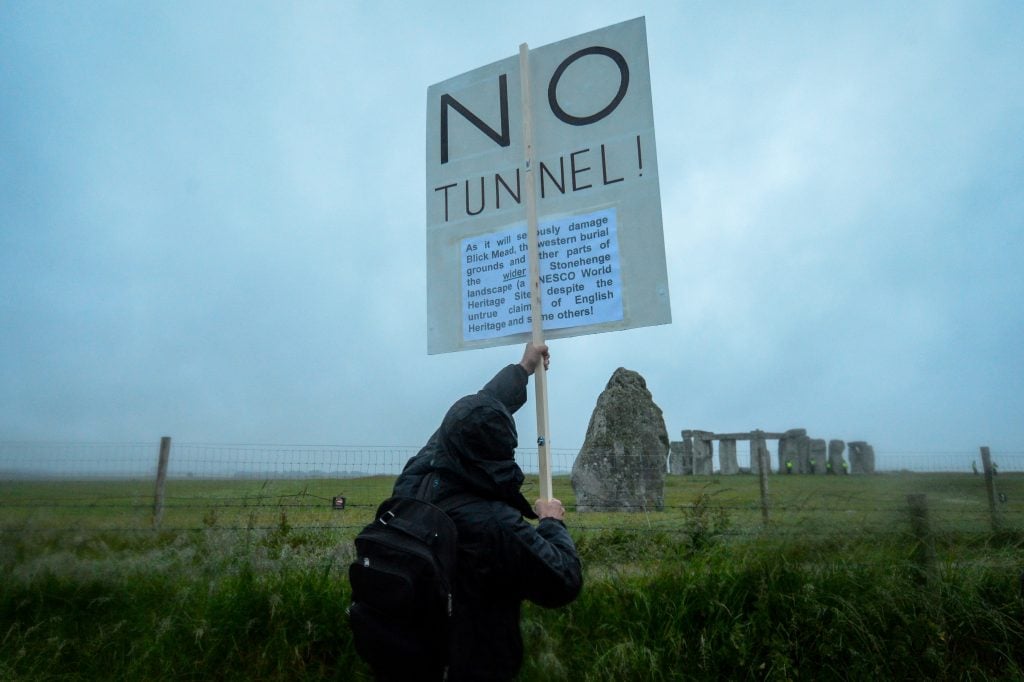Art World
Defenders of Stonehenge Are Defeated in High Court
The campaigners lost their bid to prevent a tunnel being built near to the ancient site.

The campaigners lost their bid to prevent a tunnel being built near to the ancient site.

Verity Babbs

Campaign group Save Stonehenge World Heritage Site (SSWHS) has lost it bid in London’s High Court to prevent a road tunnel being built in close proximity to the ancient Stonehenge site on Salisbury Plan in Wiltshire, the U.K.
Stonehenge was built around 5,000 years ago from ancient sarsens. More than a million tourists visit the ancient attraction each year, which is particularly popular as a pilgrimage site on the Summer and Winter Solstices. A UNESCO World Heritage Site since 1986, it is an active place of worship for druid and pagan groups. Also near to Stonehenge is the Mesolithic-era Blick Mead site, which features the oldest-known evidence of human settlements in the U.K. Initial designs for the tunnel were criticized for their dangerous proximity to the Blick Mead site.
SSWHS members claim that the project will impact the ground on which the Neolithic monument stands, which could cause it to fall or sink. They further argue that the landscape’s delicate water table, which has preserved artifacts in the ancient peat for millennia, would be irrevocably altered. National Highways say that the tunnel will minimize the sound of traffic, and will shorten journey times to the historic site. The previous route of the diverted A303 traffic will become a public walkway and cycle path.
Historic England’s Chief Executive, Duncan Wilson, said that the public body—set up in 1984 and known as English Heritage until 2015—“firmly believe[s] that putting much of the busy, noisy, and intrusive A303 road into a tunnel past Stonehenge is right for the World Heritage Site.” Historic England’s public mission statement is to “protect, champion and save the places that define who we are and where we’ve come from as a nation”.
The plans had been announced in 2017, and the project was green-lit in 2020 by the former Transport Secretary Grant Shapps. The project was then quashed by the High Court in 2021 due to concerns around its impact on the environment. In July 2023, it was re-approved by the Department for Transport. A second bid was brought to the High Court in December 2023 to have the plans rejected once again. SSWHS’s representatives in court included historians, archaeologists, environmentalists, and practicing druids. The bid was rejected on Monday in a 50-page ruling, with Justice Holgate calling parts of the SSWHS’s case “unarguable.”
In the group’s hearing which took place last year, its representative, David Wolfe KC, said that National Highways had misled the court with “fundamentally flawed” information on traffic figures for the A303, which “failed to acknowledge the heritage harm.” Representative for the Department of Transport, James Strachan KC, responded that the project sat within the “U.K.’s obligations” of the World Heritage Convention. The Convention was written in 1972 and, according to the UNESCO website, linked “together in a single document the concepts of nature conservation and the preservation of cultural properties.”
UNESCO have threatened to place the monument on its “danger list” and to strip Stonehenge of its World Heritage Site status. The agency suggested that making the proposed tunnel longer or rerouting the A303 entirely would be a more fitting solution to the traffic issue on the road.
The project will affect eight miles of the A303, which connects Hampshire with Devon and is a main route between southwest England and London. It has been estimated that the construction project will cost £1.7 billion ($2.1 billion), but this has been speculated to rise to as much as £2.4 billion ($3 billion). It is projected to be completed in early 2025.